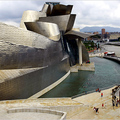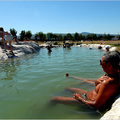Georgia, Alabama and a Bit of Gold Fever
IN retrospect, the warning signs were obvious. My heart thudded uncontrollably as I cruised along South Carolina’s verdant, rustic Route 72, and I was gripped by waves of boundless enthusiasm and irrational exuberance. Sweat beaded on my forehead and down my back — was the air-conditioning failing, or was my health? By the time I crossed into Georgia, I’d diagnosed my problem: I had gold fever — and I’d caught it from you, my readers.
Last week, I set off from New York City in a 1989 Volvo seeking low-cost high adventure on a 12-week road trip across the United States (which you can read about and watch here every Wednesday). After a weekend in Durham, N.C., I asked you where to go in Georgia and Alabama — and boy, did you respond! Within 48 hours, nearly 900 suggestions poured in, sending me from the Okefenokee swamp, near Georgia’s border with Florida, to an enclave of modernist architecture in rural Alabama.
But when Erica, a reader, suggested Dahlonega, a “cute, stereotypical little southern town” in northeastern Georgia, I knew I had to go. Dahlonega, after all, was the site of the first major American gold rush — a worthy historical destination for a traveler obsessed with his budget. Better yet, tourists like me could play prospector, panning for the precious metal in the rivers that flowed down and around these steep, hard, forest-filled hills at the south end of the Appalachians.
Dahlonega’s bed-and-breakfasts, however, were all $100 a night or more, and I couldn’t bear another night in another soulless chain motel. So I drove up to the Etowah River Campground (437 Rider Mill Road, 706-864-9035, www.etowahrivercampground.com), 28 quiet acres of grass and trees about 10 minutes from downtown. For $15 a night, I had a shady spot on the riverfront — where I knew I’d strike it rich! — and a chance to bust out the camping gear I’d bought at an Eastern Mountain Sports store in New York.
After pitching my tent, I set out to see Dahlonega proper. It is a tiny Southern town with a tidy public square surrounded by balconied buildings and the Lumpkin County courthouse, a stately brick structure with white columns built in 1836. Today, it’s the Gold Museum, and for $4 it offers a Dahlonega history lesson.
Back in 1828, Benjamin Parks was out hunting deer when he found chunks of quartz embedded with gold of unmatched purity (98.46 percent, supposedly). Within a decade, a town was born, a United States Mint established and the Cherokees — whose land contained the richest deposits — rounded up and marched west on the Trail of Tears. The mint closed at the start of the Civil War and, by the 1950s, the mining industry was dead.
It’s only in recent times that Dahlonega has come back to life, by cashing in on its past. There are knickknack shops like the Dahlonega General Store, where for just $5.95 you can buy “genuine gold bars” (painted paperweights) and restaurants like Crimson Moon (24 North Park Street, 706-864-3982, www.thecrimsonmoon.com), where I ate an excellent smoked chicken sandwich ($8.50) for lunch.
After my short tour, it was time to get rich. I returned to the campground, whose owner, a Scottish woman named Jaki Cook, had arranged for me to get panning lessons with a burly ex-bodyguard named Shane Pass. “He always finds gold,” she promised.
He’d better, I thought. Normally, Shane charges $65 for two hours of instruction in the ancient art of panning; I’d bargained him down to $35 for one hour — not exactly a bargain, but if we found a nugget, it would be worth every cent.
In a tie-dyed Grateful Dead T-shirt, Shane led us down to the banks of the Etowah, where we scouted for a place to pan, seeking a spot where debris had slowed the current, since fast water washes gold downstream. Then we looked for dense sand speckled with black iron ore. “Iron and gold, being the heaviest things in the water, when it settles, of course, it’s gonna be right there together,” Shane said.
We set to work, digging up sand and clay, running it through “classifiers” to sift out rocks and pebbles, then putting the remnants into our pans, filling them with water, and shaking them to wash out the sand while letting the heavier elements settle. As I panned, shiny flecks appeared before my eyes, but they invariably turned out to be pyrite. Once, Shane spied a sliver of golden wire but couldn’t extract it before it vanished. For at least an hour, we held out hope, shoveling and shaking and sifting. By sunset, my feet were soaked and all I’d found was a little chunk of quartz that, if I squinted, seemed to have veins of yellowish material. The experience was just as Erica wrote: "hard work, but kind of fun."
My gold fever — more a 24-hour fool’s flu — was cured.
The next morning, I drove west out of the hills to the Armuchee Bluegrass Festival, in Armuchee, Ga. Held twice a year — on Memorial Day and Labor Day weekends — it brings together banjo players, fiddlers and washtub bassists from all over the South for what feels more like a family reunion than a formal festival.
After a night of reverie, I drove into Alabama via U.S. Route 411, finally entering that Deep South of legend, a land of sprawling farms, empty roads and heat so penetrating that my car’s air-conditioning couldn’t cope. I rolled down the window and smelled melting asphalt and the smoke of backyard barbecue pits from invisibly distant villages. Brooklyn seemed mighty far away.
My destination was Tuscaloosa, which readers suggested mostly for its legendary barbecue shacks but also for its unique mix of lowbrow (football fever) and highbrow culture (new galleries and art museums). But when I arrived, this university town was eerily silent — the semester was over, the students had gone home and everyone else was away for Memorial Day weekend. I drove through the wide, empty streets, smiling at the charming Victorian houses, the beautiful University of Alabama campus and the historic district of downtown Northport, which looked right out of the 1950s, albeit with art galleries facing the five-and-dime.
It was right there, on Sunday morning, that I ran into a problem: Everything was closed — Archibald’s, the City Cafe, the galleries, the boutiques. I stood on a corner, trying to figure out where to have breakfast, when a man in glasses, salmon-colored polo shirt and yellow Livestrong bracelet asked if I needed help.
He was Danny Rountree, a local artist, and his advice proved invaluable. Sketching out a map on a piece of poster board, he directed me first to the Waysider (1512 Greensboro Avenue, 205-345-8239), a hidden-away diner where I feasted on ham, eggs, grits and tiny, bouncy biscuits ($11.36 with tip), and then, of course, to the Paul W. Bryant Museum (300 Bryant Drive, 866-772-2327, www.bryant.ua.edu; entry $2), a temple to the legendary Bama coach better known as Bear Bryant. With its litany of sports stats, a replica of the coach’s office and utter lack of historical context, it reminded me of the Joseph Stalin Museum, in Gori, Georgia (the country, that is).
Next on the list was Westervelt-Warner Museum of American Art (8316 Mountbatten Road, 205-343-4540, www.warnermuseum.org; entry $7), a stunning collection of 230 years of American painting, in the posh, woodsy suburb of Northriver. The landscapes captivated me: Thomas Cole’s Adirondacks, Albert Bierstadt’s California coast, Felix Kelly’s “Deserted Woodburner,” Edward Henry Lawson’s Southern streets. They represented the America that I was searching for — the notched mountains and spectacular violence of nature, the roadside oddities and spontaneous encounters with strangers.
I saw the beauty of the world they’d witnessed, and felt a sudden weight on my shoulders. And so I whipped out Danny’s map one last time, and drove the black line of his Sharpie pen to the cliffs at Lake Nicol. Fifteen minutes later, through hilly, winding back roads that strained the Volvo, I was sitting on a rocky outcropping 20 feet above the water, contemplating the tree-shrouded, serpentine lake before me.
The surface was calm but for the occasional plop of a fish devouring a bug. The reddening sun glowed under the arc of a dry, drooping pine branch. The air seemed silent until I caught the sonorous hoot of an owl, the tat-tat-tat of a woodpecker, the chirr of a cricket. It was the kind of place that Cole and Bierstadt might have painted if they, too, had gotten directions from Danny.
I sat there motionless, an unread book splayed on my knees. Soon, I knew, I’d be itching to get back on the road, but right now, for just a little while longer, this real-life, no-fee public art museum was the only place in the world I wanted to be.
Next stops: Tennessee and Kentucky.






